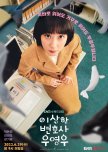This review may contain spoilers
When no one hears your sound, you begin to doubt whether you made one at all.
When no one hears your sound, you begin to doubt whether you made one at all. 52Hz isn’t the frequency of loneliness—it’s a fervent call to the vast, silent blue, not expecting an answer, only yearning to speak to the sea.
Extraordinary Attorney Woo isn’t just the story of South Korea’s first autistic lawyer. It’s a story—or countless stories—about a whale with a singular, unreachable frequency. 52 Blue, the loneliest whale on Earth, whose call at such a unique pitch no creature can hear or answer. Woo Young-woo, a soul adrift in her own world, misunderstood by others who can’t grasp what she feels. But when no one understands you, do you lose yourself, too? Without others to see your essence, your individuality, your unique self, do you fade?
Yet, is there truly only one such whale on Earth? Or is 52 Blue merely a shadow cast by the ocean’s depths?
Woo Young-woo is special, singular, but never alone. Because everything human is like that—special, singular. That shared uniqueness binds us, even if no one fully understands another, even if we barely understand ourselves. When we dare to sing our song, we’re wrapped in a rare energy, no matter the frequency, melody, or tune. That song makes us exist, makes us swim, keeps us there, at the ocean’s floor. Young-woo, with her autism spectrum disorder, is unlike any of us. Even among others with autism, no two are alike—they don’t easily “connect” with shared struggles. They face discrimination, scorn, pity, and misconceptions. Yet she’s also like all of us— with her own voice, her own tone, daring to sing, to join the vibrant anthem of sea and sky, to dive into timeless love. She’s like us because we’re all different, because everyone is. This isn’t the first series to amplify a specific “minority” community’s voice. Like others in its genre, Extraordinary Attorney Woo carries the distinct flavor of its creators, its story, its characters—everything. That’s its greatest charm, its most lovable trait.
Extraordinary Attorney Woo isn’t merely a legal drama about a lawyer and her cases. It’s a story about humanity. What sets it apart is its deep dive into civil cases—stories that seem simple, relatable, yet burn with urgency and deserve more attention. Humans are flawed; the good aren’t always virtuous, the bad not always wicked. The heart of the 16 episodes revolves around this truth—humans and their choices, their consciousness, their actions. Justice and law are measured by conduct and moral compassion, but isn’t the law, created by humans, meant to protect them, too? Lawyers stand for people, regardless of their goodness or flaws. The law protects humanity, not just legal principles.
“Do you choose to be a lawyer who defends justice or your client?”
In the series, Woo Young-woo and her team, after many steps, choose justice. Sometimes that justice is their client, sometimes it’s their faith, sometimes it’s themselves. But justice isn’t perfection. Facing justice doesn’t always mean facing evil. A villain isn’t inherently bad—just opposed to the hero, sometimes standing on a different angle, not clashing, not converging, simply apart.
Ultimately, the law regulates human behavior, not a yardstick for right or wrong.
Because human actions aren’t dictated by reason alone—they’re the embodiment of the heart. Every character, whether central or fleeting, right or wrong, paired or merely stirred by a fleeting spark, has loved and been loved. Love in Extraordinary Attorney Woo isn’t just romantic—it’s a kaleidoscope of emotions, some named, others too vast for simple words. At the start, Young-woo mimics expressions from pictures; by the end, she feels her emotions without needing to label them. Each episode brings a new case, a new story, but the thread weaving them together is emotion—a distinct current of feeling. Marital bonds, neighborly ties, parent-child love, ambition, desire, kinship, or even a fiery devotion to personal ideals. Everyone has their own ideals, their own way of thinking. “Every action and thought stems from love or fear,” because humans love themselves, love others, love life—loving with reason, with adjusted behavior, fearing mistakes. Each episode illuminates these truths.
Beyond its profound, moving, and wonderfully strange story, a great series needs more. It’s the stellar acting—actors nailing their roles and connecting with the audience, conveying characters’ emotions with striking clarity while leaving room for interpretation. The performances are truly remarkable, whether portraying champions of justice or those defying it. Every tear, every smile, every message shines through meticulous care. The visuals and color palette are sweet, serene, and utterly lovable, fostering empathy. The pacing is neither rushed nor sluggish, never frustrating. The male lead, our beloved “green flag,” is a standout, and the supporting characters are well-crafted. (Though, perhaps because Jun-ho is Young-woo’s light, his individual arc feels a bit sparse beyond their shared moments.) Team Leader Jung is phenomenal, the colleague and Geu-ra-mi are fantastic, and the friends, passersby, or those who linger all fulfill their roles beautifully. The whale CGI is impressively magical. Overall, the series is meaningful, humane, healing, gentle, polished, and deserving of its high ratings.
(My nitpicks: it didn’t fully grip me, maybe because it’s slice-of-life. The twists and actions are sometimes great but occasionally predictable, which frustrated me when characters didn’t see them coming. I also longed for the surprise I craved—it didn’t quite hit that peak. Imperfect characters are a strength, but some felt too perfect. I wished for a more cohesive flow; at times, it felt a bit disjointed. The main and supporting couples’ chemistry is solid, but their wholesome vibe left me slightly restless—sorry!)
Extraordinary Attorney Woo isn’t just the story of South Korea’s first autistic lawyer. It’s a story—or countless stories—about a whale with a singular, unreachable frequency. 52 Blue, the loneliest whale on Earth, whose call at such a unique pitch no creature can hear or answer. Woo Young-woo, a soul adrift in her own world, misunderstood by others who can’t grasp what she feels. But when no one understands you, do you lose yourself, too? Without others to see your essence, your individuality, your unique self, do you fade?
Yet, is there truly only one such whale on Earth? Or is 52 Blue merely a shadow cast by the ocean’s depths?
Woo Young-woo is special, singular, but never alone. Because everything human is like that—special, singular. That shared uniqueness binds us, even if no one fully understands another, even if we barely understand ourselves. When we dare to sing our song, we’re wrapped in a rare energy, no matter the frequency, melody, or tune. That song makes us exist, makes us swim, keeps us there, at the ocean’s floor. Young-woo, with her autism spectrum disorder, is unlike any of us. Even among others with autism, no two are alike—they don’t easily “connect” with shared struggles. They face discrimination, scorn, pity, and misconceptions. Yet she’s also like all of us— with her own voice, her own tone, daring to sing, to join the vibrant anthem of sea and sky, to dive into timeless love. She’s like us because we’re all different, because everyone is. This isn’t the first series to amplify a specific “minority” community’s voice. Like others in its genre, Extraordinary Attorney Woo carries the distinct flavor of its creators, its story, its characters—everything. That’s its greatest charm, its most lovable trait.
Extraordinary Attorney Woo isn’t merely a legal drama about a lawyer and her cases. It’s a story about humanity. What sets it apart is its deep dive into civil cases—stories that seem simple, relatable, yet burn with urgency and deserve more attention. Humans are flawed; the good aren’t always virtuous, the bad not always wicked. The heart of the 16 episodes revolves around this truth—humans and their choices, their consciousness, their actions. Justice and law are measured by conduct and moral compassion, but isn’t the law, created by humans, meant to protect them, too? Lawyers stand for people, regardless of their goodness or flaws. The law protects humanity, not just legal principles.
“Do you choose to be a lawyer who defends justice or your client?”
In the series, Woo Young-woo and her team, after many steps, choose justice. Sometimes that justice is their client, sometimes it’s their faith, sometimes it’s themselves. But justice isn’t perfection. Facing justice doesn’t always mean facing evil. A villain isn’t inherently bad—just opposed to the hero, sometimes standing on a different angle, not clashing, not converging, simply apart.
Ultimately, the law regulates human behavior, not a yardstick for right or wrong.
Because human actions aren’t dictated by reason alone—they’re the embodiment of the heart. Every character, whether central or fleeting, right or wrong, paired or merely stirred by a fleeting spark, has loved and been loved. Love in Extraordinary Attorney Woo isn’t just romantic—it’s a kaleidoscope of emotions, some named, others too vast for simple words. At the start, Young-woo mimics expressions from pictures; by the end, she feels her emotions without needing to label them. Each episode brings a new case, a new story, but the thread weaving them together is emotion—a distinct current of feeling. Marital bonds, neighborly ties, parent-child love, ambition, desire, kinship, or even a fiery devotion to personal ideals. Everyone has their own ideals, their own way of thinking. “Every action and thought stems from love or fear,” because humans love themselves, love others, love life—loving with reason, with adjusted behavior, fearing mistakes. Each episode illuminates these truths.
Beyond its profound, moving, and wonderfully strange story, a great series needs more. It’s the stellar acting—actors nailing their roles and connecting with the audience, conveying characters’ emotions with striking clarity while leaving room for interpretation. The performances are truly remarkable, whether portraying champions of justice or those defying it. Every tear, every smile, every message shines through meticulous care. The visuals and color palette are sweet, serene, and utterly lovable, fostering empathy. The pacing is neither rushed nor sluggish, never frustrating. The male lead, our beloved “green flag,” is a standout, and the supporting characters are well-crafted. (Though, perhaps because Jun-ho is Young-woo’s light, his individual arc feels a bit sparse beyond their shared moments.) Team Leader Jung is phenomenal, the colleague and Geu-ra-mi are fantastic, and the friends, passersby, or those who linger all fulfill their roles beautifully. The whale CGI is impressively magical. Overall, the series is meaningful, humane, healing, gentle, polished, and deserving of its high ratings.
(My nitpicks: it didn’t fully grip me, maybe because it’s slice-of-life. The twists and actions are sometimes great but occasionally predictable, which frustrated me when characters didn’t see them coming. I also longed for the surprise I craved—it didn’t quite hit that peak. Imperfect characters are a strength, but some felt too perfect. I wished for a more cohesive flow; at times, it felt a bit disjointed. The main and supporting couples’ chemistry is solid, but their wholesome vibe left me slightly restless—sorry!)
Was this review helpful to you?


 1
1






















